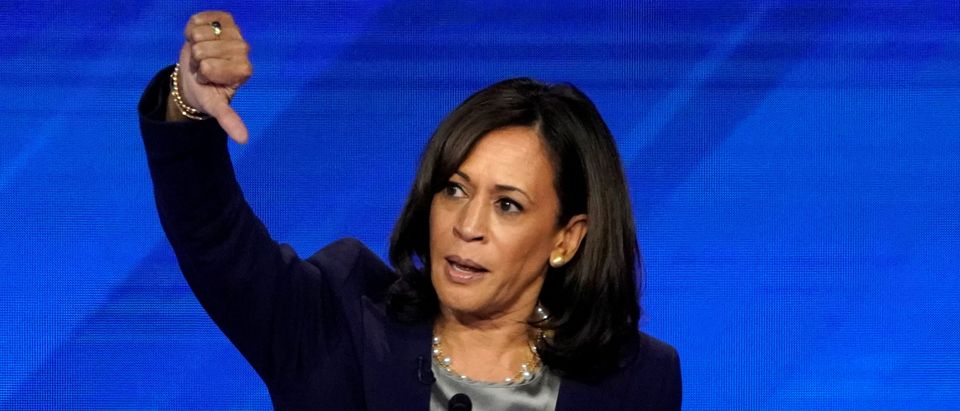The announcement of Kamala Harris as Joe Biden’s running mate has led many commentators to focus on her criminal justice record or her flip-flopping on the allowability of private insurance under her Medicare for All proposal. But it’s worth noting that the Senator from California had the dubious honor of proposing some of the worst budget ideas in the Democratic primary field as well.
The most meme-worthy of these proposals was her bizarrely specific student debt relief proposal. Under this proposal, Americans with student loans could have up to $20,000 in student loan debt forgiven — if they met three very specific qualifications. To qualify, student debt loanees must be Pell Grant recipients (already only about 30 percent of undergraduate students) who operate a business in a “disadvantaged community” for at least three years.
The downsides of this proposal are fairly obvious. After all, most students receiving Pell Grants would have difficulty accessing capital to start a business — let alone a business that has to operate in an economically depressed area, which would likely be a tough sell to investors. Moreover, the business would have to stay operational for three years. About half of all businesses fail in the first five years of being operational, and the odds can only get worse when operating in an area facing economic struggles.
Yet while that proposal was amusing for how utterly ineffective it would be, it likely would do little more than create clutter. Far more damaging would have been Harris’s proposal for a new refundable tax credit that could provide up to $3,000 annually for single filers making up to $50,000, or up to $6,000 annually for married filers making up to $100,000. As a taxpayer approached those $50,000 or $100,000 limits, respectively, the size of the credit would phase out.
The first and most obvious problem with this proposal is that refundable tax credits of this sort already exist. The Earned Income Tax Credit (EITC) does essentially the same thing, as does the child tax credit, though both are more focused on the number of children a taxpayer has. To constitute good policy, Harris’ Liveable Incomes for Families Today (LIFT) the Middle Class Act would probably make more sense as a simple modification of the EITC than as a whole new program.
But the LIFT Act would not be good policy. It would be prohibitively expensive, as the Tax Foundation estimated it would reduce revenue by more than $2.8 trillion over the course of a decade. Progressives pearl-clutched about the budget impact of the Tax Cuts and Jobs Act (TCJA), but the TCJA had just over half of the budget impact ($1.4 trillion) that the LIFT Act would.
Moreover, the phaseout would create some odd incentives. In the phaseout range, a taxpayer’s tax liability would increase by 15 cents for every additional dollar earned, significantly reducing the value of earning additional money in that range. Taxpayers at or near the phaseout range of their LIFT credit may find themselves thinking twice about pursuing additional income opportunities with such a system in place.
That disincentive to work would have a serious economic impact. The Tax Foundation estimated that the LIFT Act would decrease GDP by 0.7 percent, or the equivalent of over 825,000 jobs. That’s quite the millstone to hang around the neck of the economy.
It also suffers from another serious design flaw: a significant marriage penalty. Slate’s Jordan Weissman gives the example of a couple with a child where each partner makes $60,000. Filing as a married couple, the couple would receive no LIFT credit at all, as they would exceed the $100,000 threshold for married filers. But were the couple to merely be cohabiting, one partner could file as the head of household with the child, receiving a $3,000 credit, while the other partner would receive nothing. In this scenario, the LIFT Act would create a major financial disincentive to tie the knot.
Kamala Harris has proven that she’s not the person to go to for well-considered budgetary proposals. Should the Biden/Harris ticket emerge victorious, and President Biden tap his VP to rewrite the tax code, watch out.
Andrew Wilford is a policy analyst with the National Taxpayers Union Foundation, a nonprofit dedicated to tax policy research and education at all levels of government.


